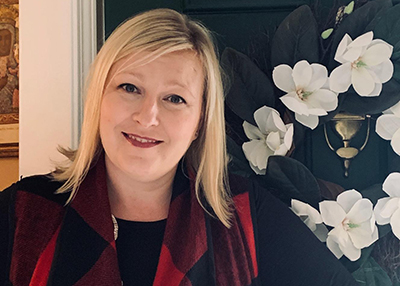October 2020 Featured Educator: Eva Schutter

As we enter our seventh month of the pandemic, it can be tough to see the positives – especially when it comes to teaching and learning.
Eva Schutter, an English language (EL) teacher, has been able to cut through the uncertainty, chaos and challenges to reflect on the advantages that a virtual environment offers her students – while acknowledging that remote learning is no walk in the park and is certainly not the best fit for everyone.
“Students have a wealth of resources at the tips of their fingers, literally, when completing their work,” Schutter said. “Once comfortable, there is nothing a student cannot translate, look up or research further to help them gain understanding. When taught to use internet resources appropriately; they have even shown me some tools that I was not familiar with previously.”
Seeking out bright spots, not just during pandemic times, is central to Schutter’s approach to teaching.
“Language learners bring so many experiences to the classroom that, if tapped into, can provide their peers with richer educational experiences,” Schutter said.
It helps that Schutter knows firsthand what it is like to have a different home language than her peers. Both of her parents emigrated to the U.S. from Poland and spoke Polish at home.
“When I was younger, I spent a lot of time hiding this from my school friends and teachers, as I first-hand experienced the lack of a school-to-home and home-to-school connection due to my parents’ language barrier,” Schutter said. “I decided to specialize in bilingual education and English as a second language because working with this specific student group gave me the opportunity to make a difference by using my own experience.”
2020 marks Schutter’s fourteenth year as an EL teacher and her ninth year in her school district, which is in Morris, Illinois, about 60 miles southwest of Chicago.
Schutter works with students in Grades 9-12 at Morris Community High School. Of the school’s approximately 900 students, about 17 percent are Spanish speakers. Other language learners speak Korean, Mandarin, Vietnamese and Tagalog.
With a diverse population of multilingual learners, Schutter and her colleagues adapt their instruction and program planning based on a student’s specific needs.
“‘One size fits all’ certainly does not have a place in my educational philosophy, especially when it comes to our EL population,” Schutter said. “Some students are newcomers who need tremendous support with language in all academic areas and to function in the school setting successfully, whereas others have much higher levels of English proficiency and require less time for language instruction through the EL program.”
Schutter’s ultimate goal for her students? To “leave the nest and fly.” (With some brief “landings” in her classroom to say hello. She considers visits from past students one of the great honors of teaching.)
To ready her students for their eventual flight, she fosters a learning environment filled with respect – a safe space where students feel comfortable participating without fear of making a mistake.
“I get to know who my students are and incorporate their likes and interests into various lessons to further create engagement,” Schutter said.
She also turns to a student’s most recent ACCESS for ELLs or WIDA Screener scores.
“The data allows me to quickly assess the needs of a student in all four language domains: listening, speaking, reading and writing,” Schutter added. “I then connect students’ English proficiency with the Can Do Descriptors to decide on appropriate activities and scaffolding necessary to facilitate language growth.”
Other tools that Schutter relies on include modeling, using visuals, incorporating graphic organizers, speaking slowly and building background knowledge.
Plus, Schutter added that WIDA is a go-to resource: “WIDA has helped me achieve my educational goals by providing a wealth of information on all things. I use the WIDA website for ELD standards, proficiency levels, resources, research, assessment tools and more!”





